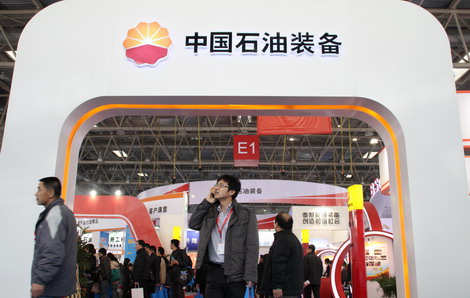 |
|
|
|
|||||||||||
|
 The China National Petroleum Corp booth at a trade show in Beijing. The company's president said in March that CNPC plans to produce 1 billion cubic meters of shale gas by 2015. [Photo / China Daily] |
Energy giant seeks partners to lend expertise in Xinjiang deposit
China National Petroleum Corp is negotiating with Royal Dutch Shell Plc and another foreign firm to jointly explore shale oil in the Santanghu Basin of Xinjiang Uygur autonomous region, the latest move after the two oil majors inked the country's first production-sharing contract for a shale gas block in Sichuan province in March.
The major aim of the cooperation is to introduce cutting-edge foreign technologies and management expertise to explore shale crude in a fast and efficient manner, CNPC said on its website on Thursday.
The three are now in commercial talks on block division and work requirements during the exploration phase, CNPC said.
Shell and New York-based Hess Corp will bear the entire investment during the exploration period before entering the development period, when a production-sharing contract will be introduced.
CNPC did not reveal the investment amount.
The country's oil majors have ambitious plans for the production of shale gas and oil as the country gears up its efforts to explore the sector to ease its heavy dependence on foreign oil.
CNPC President Zhou Jiping said in March that the company plans to produce 1 billion cubic meters of shale gas by 2015. China aims to produce 6.5 bcm annually by 2015.
The company will also set up pilot zones in Sichuan and Yunnan to turn the resources into reserves.
Its peer China Petrochemical Corp, also known as Sinopec Group, said in March the country's rapid growth in natural gas production will mainly come from unconventional gas such as shale gas and tight gas, with Sinopec's annual output expected to hit 2 bcm by 2015.
The government stressed that China will lay the foundations during the 12th Five-Year Plan (2011-15) for the sector's takeoff beyond the period.
If China exploits unconventional gas, the nation's dependence on imports of natural gas will be less than 10 percent within 20 years. Otherwise, the dependency rate may be as high as 70 percent, said Pan Jiping, a researcher at the Ministry of Land and Resources.
Pan said Chinese oil companies need to gain technological expertise from their foreign counterparts in order to make progress in the field.
Unlike Sinopec, CNPC has been much less aggressive in obtaining technological expertise in unconventional oil and gas, including shale types, through overseas acquisitions.
Instead, the country's biggest oil producer has tapped the most advanced foreign knowledge in the field by cooperating with overseas companies.
In March, Shell and CNPC signed a production-sharing contract to explore, develop and produce the 3,500-square-kilometer Fushun-Yongchuan block in the Sichuan Basin, the first such contract in China.
zhouyan@chinadaily.com.cn